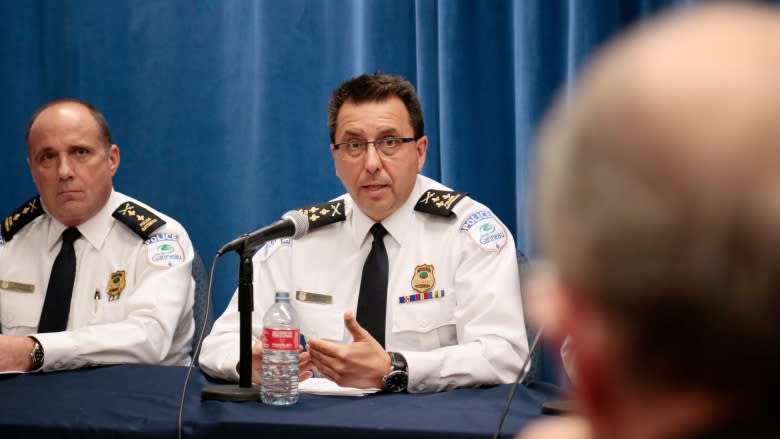Radio-Canada reporter won't face harassment charge
Radio-Canada reporter Antoine Trépanier will not face criminal charges after the subject of a recent story accused him of criminal harassment.
After examining the investigation report produced by Gatineau police following Trépanier's arrest, Quebec's director of criminal and penal prosecutions (DCPP) issued a news release Thursday afternoon concluding that no criminal act was committed.
"As a result, no criminal charges will be laid in this case," said the DCPP, which directs all criminal and penal prosecutions in Quebec under the authority of the minister of justice and attorney general.
Trépanier was arrested on March 13 after Yvonne Dubé, the executive director of the Outaouais chapter of Big Brothers Big Sisters, filed a complaint to Gatineau police.
Trépanier had been investigating Dubé after discovering she had falsely portrayed herself as a lawyer and practised law without a licence.
Trépanier spoke with Dubé by phone on March 12 and asked her for a formal interview.
After initially agreeing to the request, Dubé declined the interview at the last moment. Trépanier sent her an email the next day requesting to reschedule the interview.
Dubé then contacted Gatineau police and made a complaint of criminal harassment against Trépanier, who was arrested that evening.
During a news conference last Friday, Gatineau police Chief Mario Harel said "we have the obligation to listen to the victims… regardless if [the accused] is a journalist, a politician, a star or an ordinary citizen."
Dubé was informed of the DCPP's decision before it was made public, the news release said.
Police admit mistake
In a news conference on Thursday evening, Harel said the arresting officer had made a mistake.
The officer based his decision to arrest Trépanier solely on Dubé's statement and the "real fear" she expressed, he said.
"Clearly, the officer did not properly assess the situation."
Asked whether Dubé could face charges of public mischief, Harel said there is no investigation underway and that he considers the matter to be closed.
"We have to nuance the difference between lying to a police officer… and declaring what you felt," he said.
Reporter dumbfounded
At a news conference held at Radio-Canada's office in Ottawa, Trépanier told reporters he had not yet decided whether to sue Gatineau police for wrongful arrest.
Speaking alongside him, Yvan Cloutier, Radio-Canada's director of French services in Ottawa-Gatineau, said while the corporation has historically not pursued that avenue in similar cases, it will nonetheless weigh its options.
Trépanier said he can't understand how Dubé could have interpreted his actions as harassment, but added he remains even more dumbfounded that Gatineau police never sought his version of events.
"I have nothing against her," Trépanier said of Dubé. "But the police of Gatineau didn't do the job I did — which was to [get] the other side of the story."
Internal review underway
Gatineau police have begun an internal review of the case and will make any adjustment deemed necessary to avoid similar errors, Harel said.
The force has already updated its operational procedures as a result of the incident. In the event of any future incident involving a journalist, officers will be required to immediately inform senior leadership, who will then decide whether an intervention is warranted.
"Freedom of the press is fundamental, as is the public's right to quality, accurate, rigourous and complete information," Harel said.
"At no point did the officer choose to proceed with arresting Mr. Trépanier in order to interfere with the freedom of the press or with his work."
Still, Harel said the events of the past week have shown that his officers would benefit from a better understanding of the role, rights and practices of journalists, including charter rights and relevant Supreme Court judgments.
As a result, Gatineau police will develop a reference document for the benefit of its members in the coming weeks, he said.




